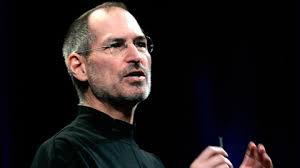A couple of members of the team argued for having a keyboard as well, given the popularity of the BlackBerry, but Jobs vetoed the idea.
考虑到黑莓手机的流行,几位团队成员主张配备键盘,但乔布斯否决了这种想法。
A physical keyboard would take away space from the screen, and it would not be as flexible and adaptable as a touchscreen keyboard.
物理键盘会占用屏幕空间,而且不如触摸屏键盘灵活、适应性强。
"A hardware keyboard seems like an easy solution, but it's constraining," he said.
“物理键盘似乎是个简单的解决方案,但是会有局限,”乔布斯说道。
"Think of all the innovations we'd be able to adapt if we did the keyboard onscreen with software.
“如果我们能用软件把键盘放在屏幕上,那你想想,我们能在这个基础上作多少创新。
Let's bet on it, and then we'll find a way to make it work."
赌一把吧,我们会找到可行的方法。”

The result was a device that displays a numerical pad when you want to dial a phone number,
最后,产品出来了,如果你想拨号,屏幕会显示数字键盘;
a typewriter keyboard when you want to write, and whatever buttons you might need for each particular activity.
想写东西,调出打字键盘,每种特定的活动都有对应的按钮可以满足需求。
And then they all disappear when you're watching a video.
但当用户观赏视频时,这些键盘都会消失。
By having software replace hardware, the interface became fluid and flexible.
软件取代硬件,使得界面流畅而灵活。
Jobs spent part of every day for six months helping to refine the display.
乔布斯花了半年时间协助完善屏幕显示。
"It was the most complex fun I've ever had," he recalled. "It was like being the one evolving the variations on 'Sgt. Pepper.'"
“这是我所拥有过最复杂的乐趣,”他回忆说,“就像参与到《佩珀中士》变奏曲中一样。”



